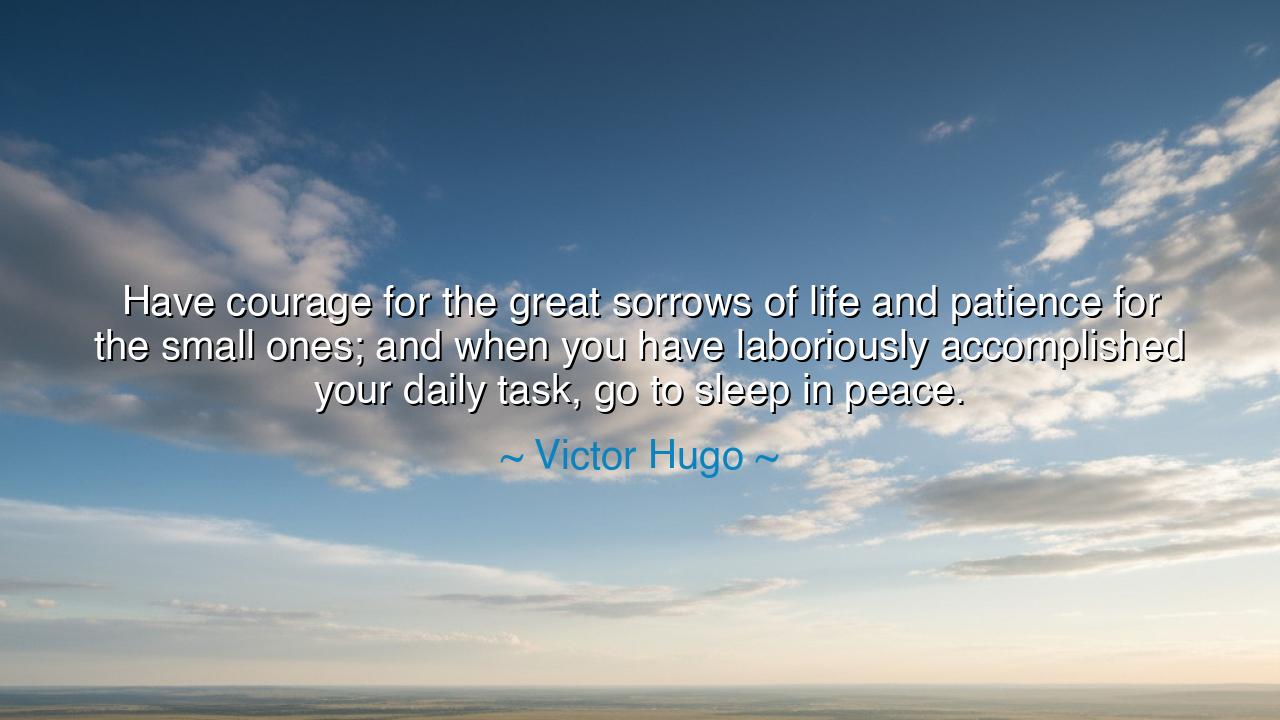
Have courage for the great sorrows of life and patience for the
Have courage for the great sorrows of life and patience for the small ones; and when you have laboriously accomplished your daily task, go to sleep in peace.






“Have courage for the great sorrows of life and patience for the small ones; and when you have laboriously accomplished your daily task, go to sleep in peace.” These words of Victor Hugo, the great French poet and novelist, are not merely a gentle counsel — they are a philosophy of endurance, a hymn to the human spirit’s quiet nobility. Spoken by one who had witnessed revolution, exile, and loss, they rise from a heart tempered by suffering yet luminous with wisdom. In them, we hear not the call to grand heroism, but the deeper summons to live with courage, patience, and peace in the face of life’s ceaseless trials.
Hugo, the author of Les Misérables and The Hunchback of Notre-Dame, understood better than most the dual nature of human pain — the great sorrows that strike like thunder, and the small irritations that erode the soul drop by drop. Through war, political turmoil, and the death of his beloved daughter, he learned that courage alone cannot carry a man through every storm; one must also have patience, that gentle strength which steadies the heart amid the thousand small vexations of living. His quote teaches that both virtues — courage and patience — are wings of the same bird, lifting the human spirit above despair.
The ancients, too, knew this truth. The Stoic philosopher Epictetus taught that life’s trials are not to be feared but accepted, for they shape the soul as the blacksmith’s hammer shapes the blade. “What then is to be done?” he asked. “Bear and forbear.” This is the essence of Hugo’s wisdom: bear the great burdens bravely, and forbear the small troubles gently. For to be strong in the face of tragedy is noble, but to remain calm amid life’s petty storms — the disappointments, the delays, the misunderstandings — is the mark of a truly wise heart.
Consider the life of Helen Keller, who lost both sight and hearing as a child. Her sorrow was beyond imagining, yet she faced it with extraordinary courage. With the help of her teacher, Anne Sullivan, she learned to speak, to read, and to know the world through touch and spirit. But her greatness lay not only in overcoming that vast darkness, but in the patience with which she endured the daily struggles of communication, the countless small frustrations that would have broken a lesser soul. Her life stands as a testament to Hugo’s teaching: that the mightiest victories of the human spirit are won not in moments of glory, but in the quiet persistence of every day.
Hugo also speaks of the sacred act of rest — “and when you have laboriously accomplished your daily task, go to sleep in peace.” Here lies another profound lesson: that a life lived with honest effort and moral serenity brings with it a deep, untroubled rest. In an age when men chase endlessly after wealth and recognition, this counsel reminds us that peace is found not in conquest but in completion — in doing one’s duty faithfully, then releasing the day without regret. To sleep in peace is to live with a clear conscience, knowing that one has met life’s demands with courage and grace.
Yet how few understand this art of peaceful living! Many fight great battles outwardly but remain restless within. They carry the burdens of unfinished anger, unspoken guilt, or relentless striving. Hugo teaches that peace is the crown of effort, the soul’s reward for a day lived rightly. The warrior must lay down his sword, the worker his tools, the thinker his pen — for rest is not idleness, but renewal. In sleep, the soul returns to the eternal rhythm of nature, where all things labor and all things are restored.
Therefore, my children, heed the voice of this timeless sage: Be courageous when life’s storms rage, and be patient when its rains merely annoy. Do not let the small troubles steal your peace, nor the great ones crush your spirit. Work with diligence, love without measure, and when the day’s labor is done, let your heart rest in gratitude. For this is the secret of endurance — to face sorrow with strength, to meet frustration with calm, and to end each day not in exhaustion, but in quiet triumph.
Thus, Victor Hugo’s words become more than a saying; they become a way of life — a sacred rhythm of bravery, patience, and peace. Live by it, and even amid the world’s noise, you shall walk in serenity. Each day will end not as a battle lost, but as a chapter completed — and when your final sleep comes, it will not be in fear, but in the gentle confidence of one who has truly lived and truly rested.






AAdministratorAdministrator
Welcome, honored guests. Please leave a comment, we will respond soon